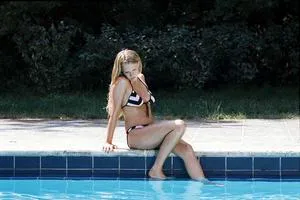The Enigmatic Allure of Ozon’s “Swimming Pool”: More Than Meets the Eye
Initially, a veil of mystery and anticipation surrounded “Swimming Pool,” fueled by the buzz around director François Ozon. However, the film was met with disappointment by some, who dismissed it as shallow. But what’s the real issue here? Is it that the film community has built up Ozon, a French director known for his LGBTQ+ themes, only to be let down by the final product? Did Ozon himself encourage this hype, or claim to possess extraordinary insight? Ozon is a skilled craftsman, not a philosopher.
He knows his craft, and that’s commendable. In this light, “Swimming Pool” can be compared to Jacques Deray’s more commercially-oriented “La Piscine” from thirty years ago, which relied on the simmering tension between Romy Schneider and Alain Delon. Ozon also works with tension, though of a different kind, and the film remains engaging and enjoyable.

Over the past three decades, genre conventions have blurred. While “La Piscine” immediately established itself as a psychological thriller, Ozon’s film keeps its genre ambiguous until the very end. It begins as an elegy about an English writer (Charlotte Rampling) who retreats to her publisher’s villa in the South of France to work on her next detective novel. The thriller elements emerge when the publisher’s daughter (Ludivine Sagnier) arrives, disrupting the writer’s peace with her brash and provocative behavior. The tension escalates around the swimming pool, taking on a sexually charged and potentially deadly tone, before shifting into a melodrama centered on the daughter’s troubled past. In the final moments, as the mysteries unravel, the film even flirts with comedy, peppered with Ozon’s signature metaphors.

Despite the shifting genres, the plot holds together. Attentive viewers will quickly grasp the underlying events. The detective writer manages to conceal a murder, profit from it, and expose the hypocrisy of those around her. She liberates her young protégé from her fears and sets her free. The perceived problem seems to be the ease with which one can decipher the film’s secrets. Everything is straightforward: the beauty of the stagnant pool filled with autumn leaves, the initial clashes with the young woman, the subsequent conflicts over her affair with a local waiter, the cover-up, and the opportunity for one to leave while the other does as she pleases. Minimal dialogue, maximum suggestive hints – and there you have it. A cheap trick, perhaps, for a supposedly iconic director.

Rampling’s Triumph
Of course, it’s a “cheap trick,” but it aligns with the contemporary notion of “doing whatever one wants.” Once, the unconventional Jean Marais admitted that there was one woman in his life with whom something could have been: Michèle Morgan. Ozon, repeatedly, attempts to convey that Charlotte Rampling is that woman in his life. Nothing will ever happen between them, but he – as a gay man – understands her as a woman. It’s like whispering “among the worlds, in the glimmer of stars, I repeat the name of one star.” He has understood and loved at least one star. Therefore, the true plot of “Swimming Pool” is not so simple. It has a different, hard-won culmination. In Ozon’s “Under the Sand,” Rampling triumphs in tragic circumstances; this time, she triumphs in comical ones. All the genre-bending serves to achieve this victory. And it makes perfect sense that the pathetic old gardener would eventually go up to the detective writer’s room and do what he does: engage in sex with a completely nude, 55-year-old woman shown in extreme close-up, while the young Ludivine Sagnier smokes in the hallway.

Ozon’s Confession
In reality, the only easy thing for François Ozon in “Swimming Pool” was to acknowledge Charlotte Rampling’s triumph over him and to advocate for this recognition as a new religion. After meeting her, one can say that Rampling is a normal woman. Well, very intelligent, aristocratic, impossibly beautiful without any makeup or plastic surgery, but just like the rest of us. However, if gay men need a religion, any of us would probably agree, and Rampling is a perfect candidate.
It costs her nothing, and it makes the world a better place.